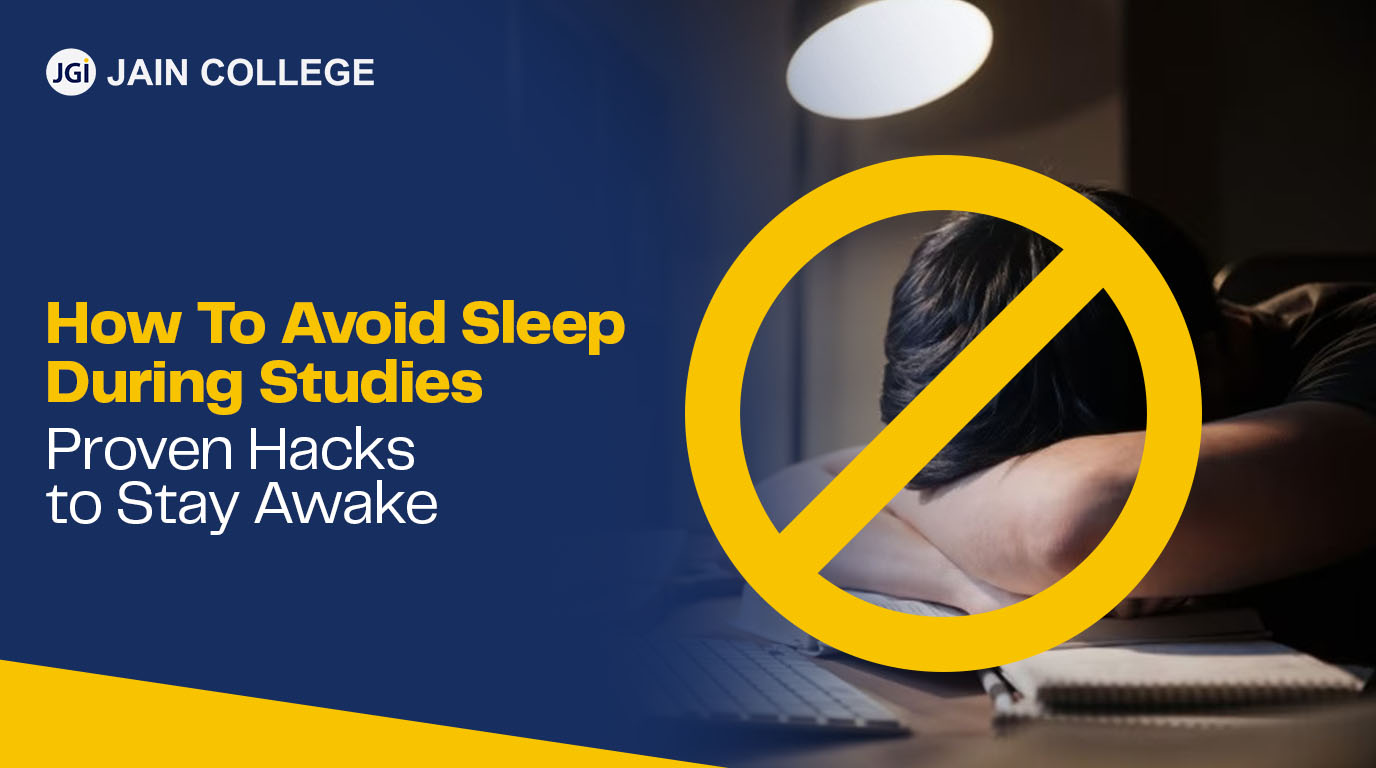
The stress of education and the insurmountable syllabus can make sleep an elusive idea even for the smartest of us. Among the many sacrifices that one makes in the quest for excellent grades and academic success is the sacrifice of sleep. Most of us know that this is easier said than done. Pulling all-nighters, staying awake till 2 a.m., sleeping at midnight with an alarm for 3.30 - 4 a.m. or, resisting the urge to hit the snooze button and snapping into an upright position tests mental and physical willpower. Let us explore some proven ways to avoid sleep during studies and hacks to stay awake.
Sitting in one place and studying for long hours is a type of sedentary activity that can slow down mental acuity. Extended hours of no physical movement can reduce the body’s alertness and relax it to the point of causing drowsiness. The deep physical relaxation coupled with intense mental application sends signals to the brain that it’s time to wind down.
Sleep is an important function that the body needs to recover from wear and tear caused during daily activity. A healthy sleep cycle is needed for improved concentration, better memory retention and physical and mental well-being. So, the most important hack to stay awake and avoid sleep during studies is to ensure you get good quality sleep for an adequate number of hours each day.
For good health, it is recommended to maintain a consistent bedtime and waking-up time. This may be difficult when you have challenging academic commitments. So, one remedy is that you try to adhere to the same bedtime and waking-up time as often as you can. Once the body clock is set, you will not require an alarm clock to sleep.
With tests, projects, revisions, impending exams, preparation for competitive tests, social life and extracurricular activities, one cannot have enough hours in the day for everything one wishes to accomplish during the day. However, being regular and planning will help relieve some of the stress and ensure that you don’t compromise on sleep.
The sedentary position while studying is what relaxes the body and makes one drowsy. Coupled with the difficulty or tediousness of some subjects or topics, it may be tough to keep one’s eyes open. Taking regular breaks, once every 20 minutes will help in recharging and refreshing.
Your activity during the break time will help you manage the drowsiness better. Avoid nibbling on junk food or unhealthy drinks. Drink a lot of water, opt for healthy alternatives such as fruits or dry fruits for snacks and eat a balanced, healthy, home-cooked meal at regular hours. Spare at least 30 minutes daily for some form of exercise. Going outdoors is advisably, to play, cycle or simply walk can also work wonders.
To be actively engaged in studies and to absorb the information, don’t just read and read class notes or textbooks. These are sure to make you drowsy. Use active study techniques to stay awake and make your learning more productive. Some techniques are -
Stretching can help in improving blood circulation as you sit for long hours to study. There are many stretching exercises that one can do with the chair they are seated in. Stretching also makes us conscious of our posture. If you sit straight, your body will be alert compared to hunching over or slouching on a book.
The painter MF Hussain used 10-minute power naps to avoid falling asleep and taking him away from his work. Power naps are proven to improve the brain's functions and enable us to stay awake longer when we are doing deeply engrossing work. Practice 10-20 minute power naps to help you get over the sluggishness that comes from sitting long hours at a task.
Sit in a well-lit space where the light is not glaringly harsh or too dim. Our bodies are attuned to respond to environmental signals such as light and darkness and light promotes wakefulness. When you are planning long study hours, then try to mimic a daytime environment with plenty of light. A single lamp shining on the book or overhead light might not be enough to keep you alert.
Avoid external stresses besides the stress you have from your schedule. Surround yourself with family and friends who give positive reinforcement and support you while you are so deeply engaged.
Most importantly, try not to compromise on sleep in favour of any other activity. Your schedule must be designed to ensure that you are well rested so that you are better equipped to handle the stress of your routine. How you handle sleep now will determine the long-term impact on your health and well-being.

JAIN PU College, a part of the renowned JGI Group, is committed to empowering students with quality education.
Beyond academics, the college ensures its online content reflects the same standard of excellence. Every blog and article is meticulously vetted and proofread by subject matter experts to ensure accuracy, relevance, and clarity. From insightful educational topics to engaging discussions, JAIN PU College's content is crafted to inform, inspire, and add value to its readers, reflecting the institution's commitment to intellectual growth and innovation.
View all Blogs